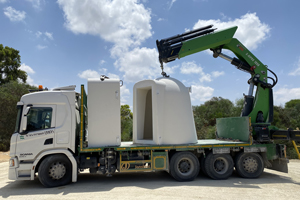
ICEJ Orders 30 Bomb Shelters
ICEJ orders 30 more bomb shelters for vulnerable Israeli border towns
Focus of security assistance shifting to rocket threat in North
 The International Christian Embassy Jerusalem has recently ordered another thirty new portable bomb shelters which will be delivered in coming weeks to Israeli border communities which are especially vulnerable to rocket fire from Gaza and Lebanon, with an increased focus on protecting civilians in the northern Galilee and Haifa regions.
The International Christian Embassy Jerusalem has recently ordered another thirty new portable bomb shelters which will be delivered in coming weeks to Israeli border communities which are especially vulnerable to rocket fire from Gaza and Lebanon, with an increased focus on protecting civilians in the northern Galilee and Haifa regions.
With these shelters, the ICEJ has now donated a total of 155 bomb shelters in the last 15 years to Israeli communities under rocket threat, with the majority (129) placed in towns along the Gaza periphery and the remaining 26 in the North.
Over the past decade, the Negev region has received most of the attention from government and private sources seeking to better protect the local civilian population from frequent rocket barrages. Working in partnership with Operation Lifeshield, the Christian Embassy has placed dozens of mobile bomb shelters in the Gaza envelope, in communities stretching from Kerem Shalom in the south all the way up through Sderot and Ashkelon. Most have been donated to schools, daycare centers, medical clinics, youth centers, community halls, college campuses, factories and other public places which cannot operate during times of crisis without adequate bomb shelters.
However, the need for more bomb shelters in the North has become an increasing concern, especially due to the severe lack of public shelters and Lebanon’s growing economic crisis. Thus, the Christian Embassy is shifting its focus to assisting towns in the northern Galilee and Haifa regions to protect their most vulnerable communities.
A State Comptroller report issued last year warned that 2.6 million residents of northern Israel do not have access to functional bomb shelters. While there have been efforts to upgrade existing shelters, the state budget has provided little funding to add new and better shelters, due in part to the instability of Israel’s government over recent years and the priority given to resupplying the IDF’s Iron Dome batteries.
The need for more shelters is most acute in the towns right along the northern border with Lebanon, which are prone to shorter range rockets that cannot be stopped by the Iron Dome system. This hilly, forested area contains a diverse mosaic of Jewish, Arab and Druze towns which are desperately looking for funding to provide better protection for their communities. Other areas of concern are the Jewish and Arab farming villages in the Zevulun regional council just east of Haifa, which are close to strategic facilities – such as oil storage tanks and chemical plants – which Hizbullah will likely target in any future conflict.
In the coming weeks, the Christian Embassy plans to deliver some of the new shelters now on order to public places in Haifa, Nahariya, Akko, Kfar Maccabi and elsewhere – all in consultation with local security chiefs.
Over recent months, the ICEJ has received donations for these latest bomb shelters from Christians in dozens of countries, most notably from Brazil, Canada, China, Czech Republic, Fiji, Germany, Ireland, Netherlands, South Africa, Switzerland, the United Kingdom and United States.
“Many Israelis living along the Gaza border have told us that these mobile bomb shelters indeed save lives and give their families the peace of mind they need to continue their daily lives under the constant threat of rocket attacks,” said ICEJ President Dr Jürgen Bühler. “We now want to focus more on the need for additional bomb shelters to protect civilians in the North. The existing public shelters are not enough and these portable shelters are an effective way to provide greater security to the smaller towns and villages in the Galilee and Haifa regions that are often overlooked.”
Dr Bühler added that the Christian Embassy also is keen to promote Jewish-Arab coexistence with these shelters donations through local authorities in the North.
Get more information and help us place more bomb shelters:


